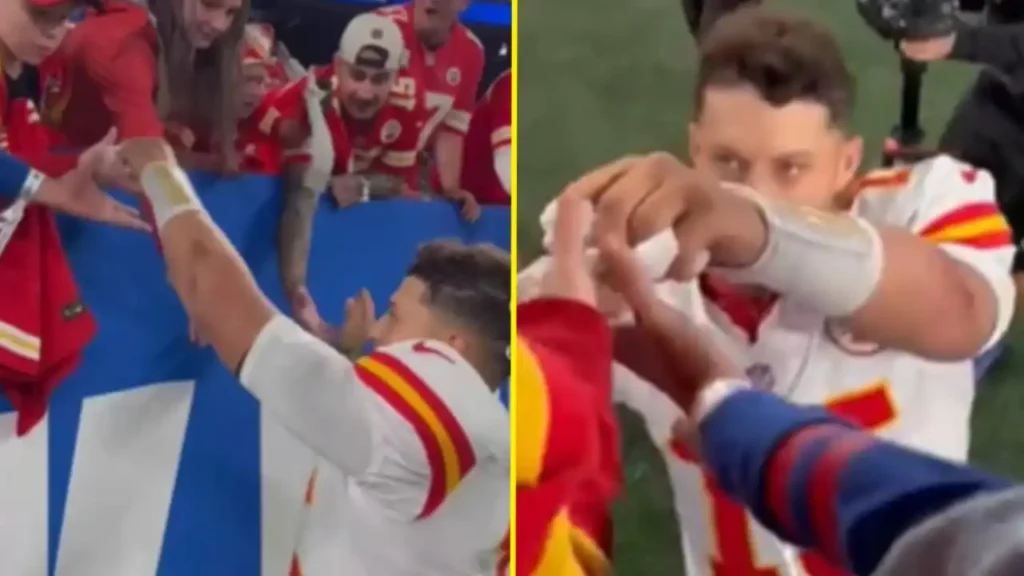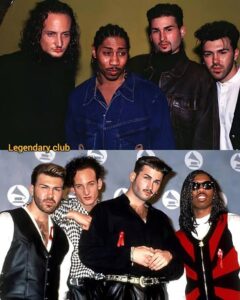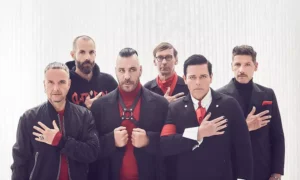
“NFL Karen” Controversy: Chiefs Owner’s Wife Steps In After 10-Year-Old’s Birthday Gift Is Snatched
A Viral Clip, A Birthday Ruined
During Week 3 of the NFL season at MetLife Stadium, a moment intended to delight a young fan instead sparked outrage. Kansas City Chiefs quarterback Patrick Mahomes attempted to gift his headband to a 10-year-old boy in the stands. The boy, whose name is reported to be Joey, was in the crowd celebrating his birthday.
But as Mahomes reached out to the child, a woman — later identified as Nina Miller — snatched the headband away. The reaction was swift: in the video, the boy is heard in disbelief: “Yo, she just stole that from me.”
The clip spread like wildfire on social media, with fans and commentators condemning the act. The woman was quickly dubbed “Kansas City Karen” — a moniker referencing prior viral incidents in sports where a bystander hijacked a moment meant for a child.
The Woman Speaks: Apology and Explanation
In the days following the backlash, Miller took to TikTok to address the situation. Initially, she posted as though she believed Mahomes had personally handed the headband to her — but that video was later removed. In subsequent posts, she apologized, explaining that the noise and excitement at the game had confused her.
She said she “honestly thought Pat Mahomes was giving me the headband” and “reached for it without thinking.” Upon learning that the gesture was intended for a child’s 10th birthday, she expressed regret:
> “When I found out that it was meant for that little boy … I felt horrible … To the young boy, I’m sorry that I ruined your moment. You should have had your moment for your birthday.”
Miller offered to return the headband (or otherwise make amends) if the parties could be connected. She also framed her mistake in broader terms, saying she is “a mom and a Christian” prone to error, but that the online criticism she’d faced had at times been “cruel.”
Enter the Hunt Family: Ownership Steps In
In short order, the Chiefs organization and its owners became involved. Tavia Hunt, wife of Chiefs chairman and CEO Clark Hunt, publicly sought to identify the child in order to make things right. She posted images of the boy on her Instagram Story along with the plea, “If anyone knows who this boy is, message me!”
Within hours, she announced the child was located: “We found him! Surprises ensuing!” The details of those “surprises” have not been publicly disclosed.
The move echoed precedents in other sports. A similar case in Major League Baseball (dubbed the “Phillies Karen” incident) involved a fan snatching a home run ball from a kid; the club later intervened and rewarded the child with team gear and a special experience.
Public Reaction, Social Media Firestorm
Online reactions came fast. Many users saw the incident as yet another example of entitled behavior overshadowing a heartfelt gesture. Comments ranged from support for Mahomes and the child to condemnation aimed at Miller:
“This woman is NASTY … grown people can’t control themselves!” one commenter wrote.
“Patrick Mahomes will take care of ya kid. Screw that lady,” another added, tagging Mahomes directly.
On platforms like X (formerly Twitter), the outrage was amplified by those comparing the act to broader concerns about entitlement, sportsmanship, and respect for children at live events.
Some commentators also questioned whether such incidents should prompt changes in stadium security or fan conduct guidelines, ensuring that players’ goodwill gestures reach their intended recipients. Others framed it as a reminder that viral moments can carry real emotional weight, especially when children are involved.
What Happens Next?
While the Chiefs and Hunt family have taken steps to locate the boy and presumably make reparations, the resolution remains partially private. Here’s what to watch:
Details of the “surprises.” Whether the team offers a meeting with Mahomes, special tickets, or extra memorabilia is not yet public.
Media coverage of the boy’s reaction. Will the child speak out? Will his family? That could influence public sentiment.
Organizational policies. The Chiefs or the NFL might consider measures to better protect on-field or player-to-fan interactions, especially involving children.
Broader precedent. This incident may encourage other teams to act swiftly in similar moments, or league-level guidelines might emerge.
Why This Is a Big Deal
At its core, the controversy emphasizes several key points:
1. The sensitivity around interactions with young fans. When NFL stars try to make personal gestures, those moments carry emotional weight — especially for kids.
2. Social media’s role in accountability. The viral video mobilized fans and the Chiefs’ ownership to respond quickly.
3. Ownership’s brand and reputation. The Hunt family’s prompt engagement helps frame the narrative positively: not just passive caretakers of a franchise, but active participants in fan relations.
4. Public expectation of redress. In an age of digital amplification, inaction is often seen as complicity.






